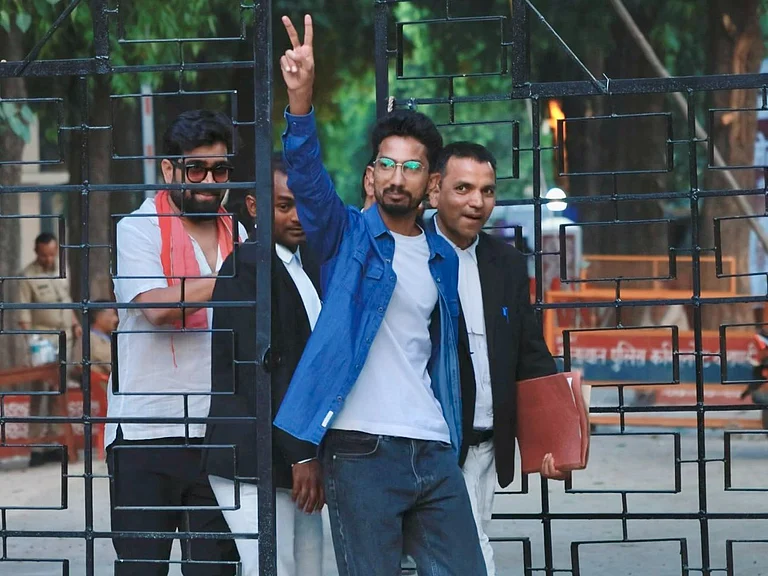Twenty-nine-year-old Shyam Rangeela wanted to contest the Lok Sabha election this year as an Independent candidate. A comedian and mimicry artist, Rangeela hails from Rajasthan and is best known for his impression of Prime Minister Narendra Modi. He took his chances fighting the polls against none other than Modi as he filed his nomination papers from Varanasi Lok Sabha constituency on Tuesday. However, the Returning Officer (RO) of Varanasi on Wednesday evening told him that his nomination had been rejected “on the ground that he did not take the oath”.
Lok Sabha Election 2024: Why Was Shyam Rangeela's Nomination From Varanasi Rejected?
Facing several hurdles, comedian Shyam Rangeela had filed his nomination as an Independent candidate from Varanasi Lok Sabha seat, from where Prime Minister Narendra Modi is also contesting.
Rangeela has been active on his social media handles explaining the hurdles he had been facing to file his papers from the high-profile seat. In a video, he was seen asking the policemen why he was not being allowed beyond the police barriers to file his nomination. A police officer informed him that entry had been closed due to “security reasons” and that he should come back after 12 pm, “as informed to other candidates as well”. This was the second day he tried to file his nomination, Rangeela said.
Notably, Prime Minister Narendra Modi filed his nomination in Varanasi on Tuesday morning amid a show of strength by NDA leaders, including Union ministers and chief ministers, as he seeks a third term from the Varanasi Lok Sabha constituency.
Why Was Shyam Rangeela’s Nomination Rejected?
After two days of back-and-forth, Rangeela was able to file his nomination before the 3 pm deadline on Tuesday, the last day of filing nomination for Phase 7. However, the next day – the day designated for scrutiny of papers, his nomination was rejected.
"Today, the District Magistrate told me that there was some issue with my documents and that I did not take the oath. They did not let the lawyers go in with me and called me alone. My friend was beaten up. Modiji may act and cry, but I don't want to cry here," Shyam Rangeela said.
"It was decided that I will not be allowed to contest from Varanasi, now it is clear," he said in a subsequent post.
Varanasi District Magistrate and RO S Rajalingam replied to this saying, “Your nomination paper was scrutinized in your presence and you were informed about the deficiencies. Your nomination paper has been cancelled because the affidavit submitted by you was incomplete and you did not take the oath/affirmation, a copy of the order of which has also been made available to you.”
What Does The Election Commission’s Handbook Say?
According to the handbook for RO by the Election Commission of India (ECI), an oath has to be taken by a candidate in the presence of the person authorised by the ECI after filing nomination paper and before the date fixed for scrutiny. As per Article 84 of the Constitution, any citizen who wishes to contest elections must take an oath to “bear true faith and allegiance to the constitution of India as by law established” and “uphold the sovereignty and integrity of India”. Not taking the oath is a ground for rejection of nomination papers.
However, the handbook also says that if the affidavit, extract/copy of electoral roll wherever required has not been filed and if the oath is not taken, the same “should be clearly mentioned in the bottom of the check list, indicating the time limit by which this can be submitted”.
Since the oath can be made only after the nomination paper has been delivered and before the date of scrutiny, the RO is required to advise the candidate to make the oath immediately after presenting their nomination papers and before the deadline ends.
What Happens If A Candidate Alleges Unfair Treatment?
Rangeela has said that his nomination was accepted at 2.58 pm on Tuesday, with only 2 minutes to the deadline. He admitted that the RO then pointed out to him that a required affidavit was missing following which he had the document made and submitted later. But he claimed that the RO never told him about the oath until after the rejection.
According to the RO handbook, scrutiny of nomination papers is an important quasi-judicial function. “The RO therefore has to discharge this duty with complete judicial detachment and in accordance with the highest judicial standards. Returning Officer must not allow any personal or political predilections to interfere with the procedure that he/she follows or the decision he/she takes in any case,” it says.
If any candidate feels their nomination was rejected unfairly, they can challenge it later in an election petition under Section 9A of the Representation of People Act.
Tags
